General
Mak Acquires US$ 3 million Modern Poultry Unit Funded by KOICA IBS Program
Published
7 years agoon
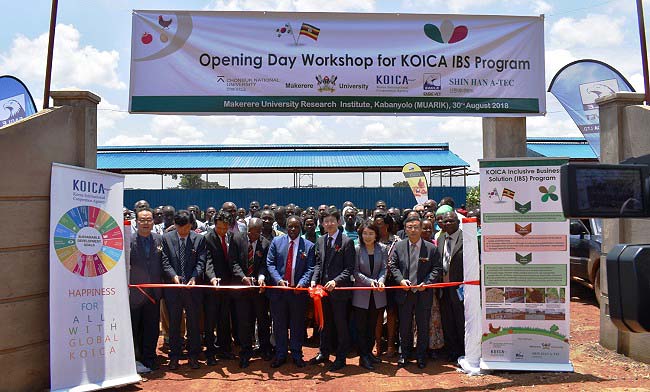
Makerere University College of Agricultural and Environmental Sciences (CAES) has opened up a modern poultry unit at the Makerere University Agricultural Research Institute Kabanyolo (MUARIK) worth US$ 3 million.
70% of this budget is funded by the Korean International Cooperation Agency (KOICA) and another 30% by Eagle Vet. Additionally, Shinhan A-Tech is funding 30% of the horticultural enterprise.
The opening day workshop was held on Thursday, 30th August 2018 at MUARIK following 90% completion of the construction work. Construction commenced on 30th May 2018 and is expected to be complete by 30th September 2018.

The function was attended by the Country Director KOICA, Professors of Chonbuk National University (CBNU), the Chief Director, Eagle Vet Uganda, the Director KOPIA and the President, Korean Community in Uganda among others.
Makerere University was represented by the Deputy Vice Chancellor in charge of Finance and Administration (DVCFA) Prof. William Bazeyo, CAES Principal Prof. Bernard Bashaasha, his Deputy Dr. Gorettie Nabanoga, staff from Makerere and other universities as well as farmers.
This development comes after Makerere University and Chonbuk National University’s International Agriculture Development and Cooperation Center (IADCC) signed an agreement in May 2016 to implement the KOICA (Inclusive Business Solutions) IBS Project.

Makerere University allocated part of the university farm land; totaling 4.2 acres, to the project. The project has constructed three (3) poultry units with a capacity of five thousand (5000) birds each, implying a total capacity of 15,000 birds. The focus is mainly on layers for egg production.
Additionally, a brooder house was constructed to raise chicks as well as a drying shed for dehydrating chicken manure. A microbial facility to grow micro organisms to be used in the fermentation of chicken manure has also been constructed. This will provide readily available organic chicken fertilizer to farmers hence strengthening the linkage between crop and livestock production.
The project intends to contract farmers that will supply raw materials like maize and soybean to process feeds for chicken. These inputs will be bought at higher prices to increase farmers’ income.

The project will also construct a six hundred square meter (600m2) greenhouse that will produce quality tomatoes.
Additionally, the project will train farmers on improved agricultural technologies at National Farmers Leadership Center and also share 30% percent of the profits with farmers.
In his congratulatory message, the Korean Ambassador to Uganda represented by Lee Jun-hee appreciated the project partners for the accomplishments so far, saying this will contribute to Uganda Vision 2040 of transforming the country from peasantry to a middle income status.

The Ambassador noted that Uganda’s agricultural sector employs 2/3 of the household labour force and accounts for 77% of poverty reduction.
“Despite this, agriculture in Uganda is underdeveloped and its contribution to NGDP has declined to 25% with less economic gains due to unsustainable use of resources,”
He said, besides accelerating commercialization of agricultural products, private enterprises and research institution must pool together resources to fight poverty and improve livelihoods.

In his remarks, Prof. William Bazeyo commended the Principal CAES Prof. Bernard Bashaasha for not being selfish.
“Many of us have studied from outside but what have we brought back home? I thank Prof. Bashaasha because without his thinking and not being selfish, these Korean colleagues would not be here. Prof. Bashaasha went and found that there is potential in Korea to bring to Uganda”. Bazeyo said.
Prof. Bashaasha studied in Korea, Married a Korean lady and has attracted collaborations with Korean government and agencies setting up a number of projects at Makerere University.

The DVCFA thanked the Korean Government for accepting to work with Makerere and supporting the university through finance and technology.
“I believe your investment in Uganda may not lead to tangible results back to the people of Korea but you are doing it to develop the people of Uganda to be like you.
Makerere University will not take you for granted. We know we are with you in the struggle to eliminate poverty and improve livelihoods,” the DVCFA stated.

Prof. Bazeyo hailed the Chief of KOICA in Uganda for being polite and humble saying it is one thing to be posted to a country, and, another to work with the people. He informed participants that Makerere University existed for a long time and some of its infrastructure is old. Prof. Bazeyo pledged to look for partners and mobilise resources to rehabilitate the old poultry unit on the University farm and also deploy armed security to safeguard the new facility with immediate effect.
The DVCFA also noted that there are more than 40 universities in Uganda but only two offer programmes in agriculture, and yet more people need agriculture than any other resource. He therefore stressed the need for Makerere to reach out more and work with farmers to alleviate poverty by bringing them to the University farm and train them on how to generate income.
“Extension workers are few and far spread and yet we need to train these farmers. It could not be a government policy, but as Makerere we can go out there and train farmers to increase production.

We must change the mentality of people on how to do farming as a business for maximization of resources to get them out of poverty”, Bazeyo explained and went ahead to say that:
“The Challenge is on Makerere because we are the father of education in this country.
Can we have similar facilities across the country and train farmers on how to rear chicken and other animals?

There is no harm in putting such facilities on our borders so as to train our neighbors” He said.
Prof. Bazeyo expressed happiness that Korea was walking with Uganda. Historically, he said, Korea started like Uganda and at one time, the two nations were at the same level.
He said that Koreans are now holding Ugandans’ hands, and yet they should be looked at as equal partners.

He appealed to the farmers and their leaders to mobilise themselves in groups, and pool their fragmented land for improved productivity, collective bargaining and marketing.
He also asked farmers to work with academicians adding that the University cannot conduct graduate education and research without farmers.
The Principal CAES, Prof. Bernard Bashaasha gave the background to the project and expressed happiness at seeing the fruits. He said the MoU signed in May 2016 when the President of CBNU visited Uganda entails academic training, research, staff exchange and outreach.

Prof. Bashaasha reported that currently there are 13 students in the Republic of Korea who are doing very well and are expected to return to Uganda upon completion of their studies.
“The other activities are the poultry unit and an element of micro organism processing extended here. There is an element of horticulture and the facility will help us in training. We really needed a poultry facility to help in training, research and outreach activities,” the Principal said.
Bashaasha also said the college was partnering with Moon Agriculture and Processing Company Limited (MAP Co. Ltd.); a private Korean firm, and have already opened up a fully fledged piggery unit at the University farm.

He also said the choice of the poultry enterprise is based on the fact the country’s population; especially in the urban areas, is ever increasing and yet land cannot be expanded. This necessitates going into intensive production with poultry as a viable option.
The other reason according to Prof. Bashaasha is that poultry combines very well with crop thus creating seamless interaction between crop and livestock production.
Briefing participants on the project background and purpose IBS Program Manager Chonbuk National University (CBNU) Cho Jin-Kook said the project is aimed at addressing low income due to poor agricultural environment, the weakening base of agricultural and livestock production due to climate change impacts, and the increase in demand for professional agricultural technology education.

Cho Jin-Kook explained that the project, “Improving farm income through agriculture and livestock circulation in Uganda”, will last three years (2018-2020) at a total budget of US$ 1,826,087.
The project purpose is poverty reduction through increasing farm income; contributing to the livelihoods of local farmers by improving the agricultural environment in response to climate change; strengthening the business operation capacity and growth potential by establishing a social enterprise.
The goal is to establish the eco-friendly recycling model of agriculture linking horticulture and livestock farming, and finally to increase farmer's income by strengthening farmer capacity,” the Manager said.

The expected benefit according to Cho Jin- Kook is operating an economic model connected by value chain type to solve poverty and lower socioeconomic polarization, improving farmers' income level through operation of Agro-industrial facilities in response to climate change, training skilled workers in agricultural industry and enhancing the sustainability through collaboration between stakeholders and public institutions.
“The core activities include production of eggs and chicken meat, drying and storage of feed crops, production of tomato and agriculture crops and supplying the organic fertilizer fermented with livestock manure.
Targets for the year 2020 year include; Feed resource production (1,000 tons), Livestock products (138 tons) and Horticulture production (10 tons).
Our IBS project policies will increase Kabanyolo farmer's revenue and finally contribute to the economic development of this Country”. Cho Jin- Kook explained.
Article Compiled by:
Jane Anyango
Principal Communication Officer,
College of Agricultural and Environmental Sciences (CAES)
You may like
General
From Campus to Career: Makerere Advancement Office, 91st Guild and the DFCU Foundation Equip Students with Financial and Employability Skills
Published
7 days agoon
December 5, 2025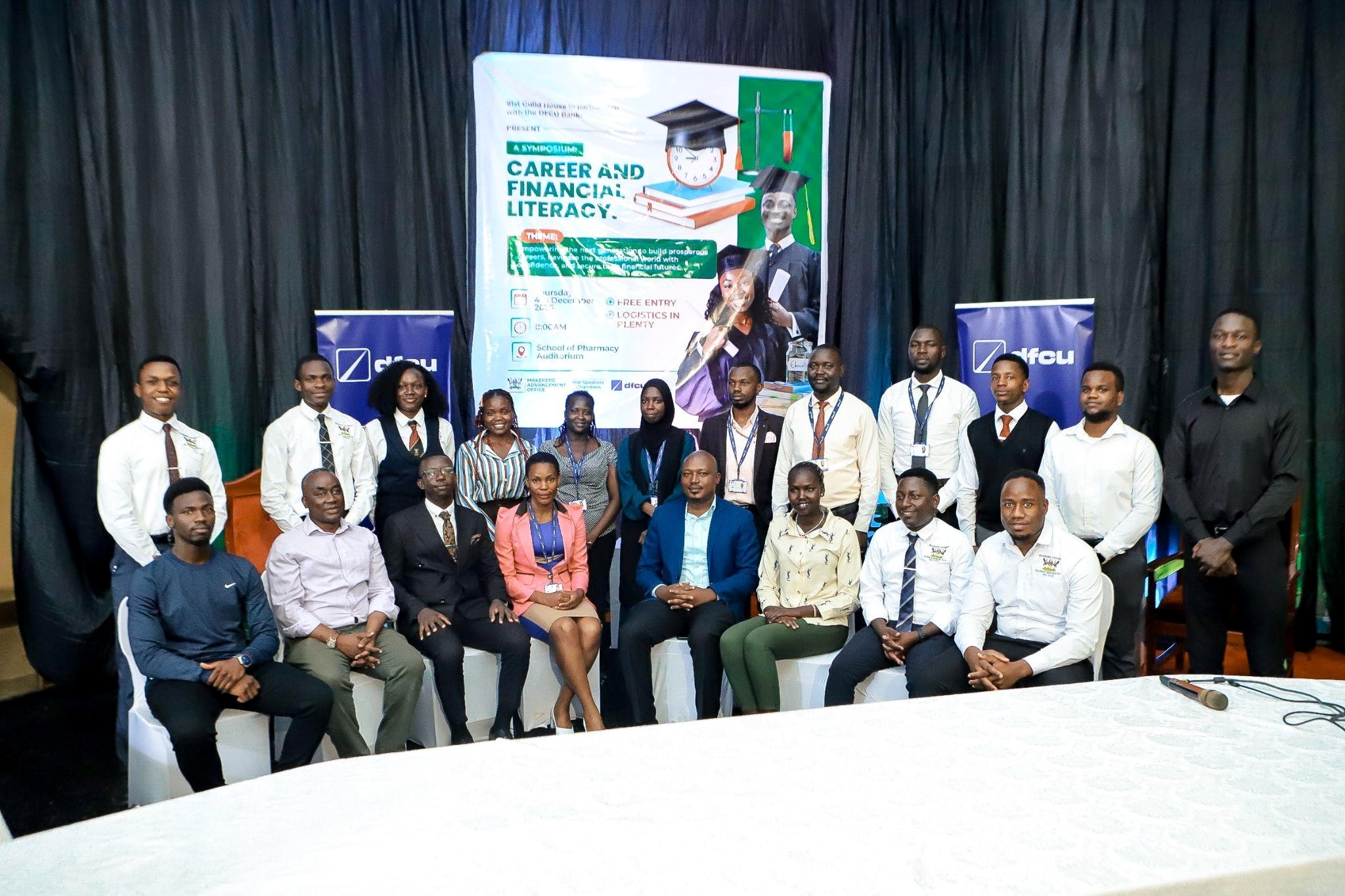
On 4th December, 2025, over 200 final-year students gathered at the School of Pharmacy Auditorium for the highly engaging Career & Financial Literacy Symposium, hosted by the 91st Students’ Guild, in partnership with the Makerere Advancement Office and the DFCU Foundation.
The symposium centred on student advancement through strategic partnership, convening students, administrators and development partners for a practical conversation on career readiness, financial literacy, employability, and personal development.
Advancement Through Partnerships
Speaking on behalf of the Makerere Advancement Office, Mr Awel Uwihanganye, Chief Advancement Officer, underscored the importance of partnerships such as the one with DFCU Foundation. He highlighted their importance in equipping students with marketplace skills and opportunities vital for individual growth after University.
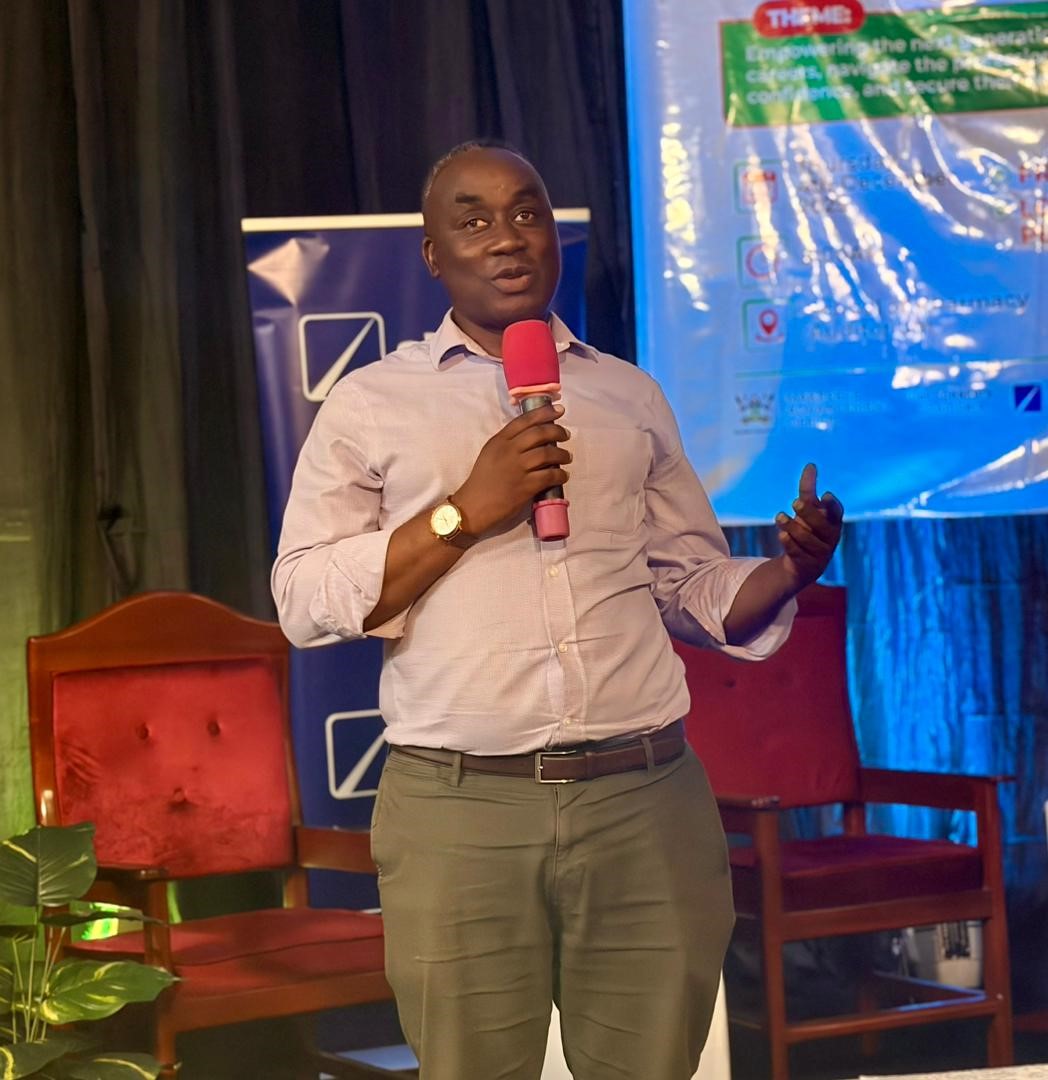
He reflected on the university journey as a formative period for ideas, innovation, and lifelong relationships, noting that:
“University is where impressions are made, and future networks are born. The friendships, character, and collaborations you develop here become foundations for careers, enterprises and leadership later in life.”
Mr. Uwihanganye encouraged students to embrace entrepreneurship, creativity and innovation, arguing that the emerging workforce is driven by technology, multi-tasking ability and idea generation rather than traditional single-path employment. He challenged students to build businesses, use digital platforms productively, and regard employment as only one income stream, not the only one.
The Student Perspective — Discipline, Skills and Trust
Speaking on student growth and personal development, Dr. Rodney Rugyema, Deputy Dean of Students, highlighted the realities facing new graduates, especially those entering the job market for the first time. With humour and honesty, he urged students to approach growth intentionally and responsibly.
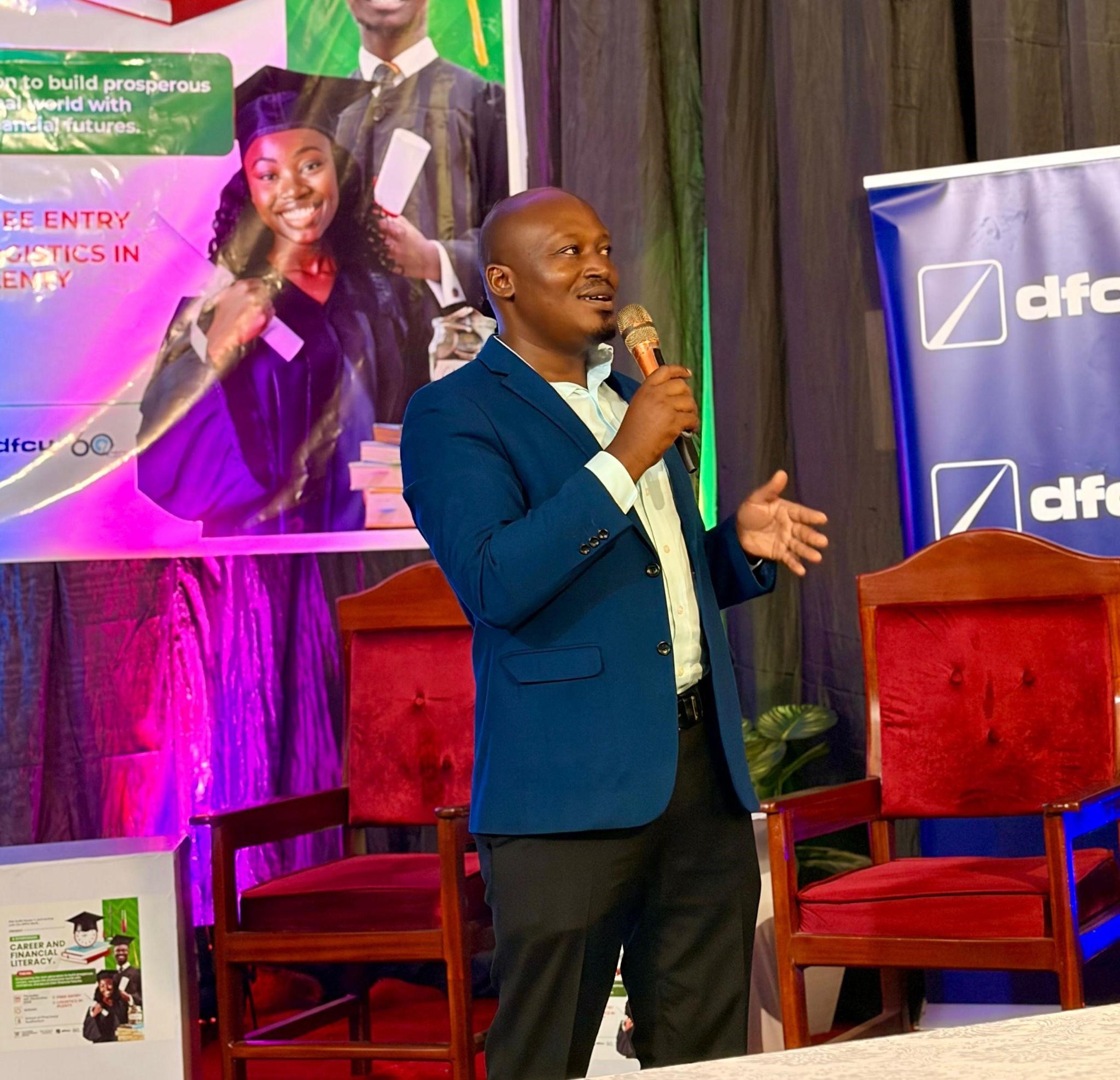
He called for delayed gratification, financial discipline and long-term decision-making, reminding students that wealth is built, not wished for. He emphasised the importance of skills beyond academic papers, stating that students must be equipped to create value, adapt, learn continuously, and gain competence relevant to modern work demands.
Dr. Rugyema underscored that trust, integrity and reliability remain the most non-negotiable pillars of professional advancement.
“Let people trust you enough to lend you an opportunity. Be a person who delivers. Your reputation is currency; it travels to rooms you are not in.” He noted
Financial Literacy for the Next Generation
The keynote training session was delivered by Mr. Simon Omara, Business Advisor representing the DFCU Foundation, who walked students through a highly practical presentation on financial planning, savings culture, credit management, record-keeping, career positioning and entrepreneurship.

With more than 10,000 graduates annually and less than 35% securing employment within the first year, Mr. Omara challenged students to practice financial and career ownership early. His presentation explored:
Key Competencies Students Must Build
- Financial management with a focus on budgeting, saving, and investing early
- Career readiness, CV development, interview skills, and personal branding
- Entrepreneurship and income diversification
- Record keeping and credit management
- Professional conduct and workplace preparation
He reminded students that the future belongs to those who are financially literate, skilled, trusted and entrepreneurial. Through relatable examples and actionable frameworks such as the 70–20–10 rule, the 7-second CV scan, and the 90-day post-graduation growth plan, Mr. Omara equipped participants with practical knowledge they could act upon immediately.
Why This Symposium Matters
This event stands as a testament to the power of partnership-driven student advancement, a core mandate of the Makerere Advancement Office. By convening industry partners like DFCU Foundation, the University continues to ensure that students graduate not only with knowledge, but with tools and readiness for opportunity.
The symposium strengthened linkages between academia and the labour market, expanded students’ perspective on financial independence, and emphasised the value of entrepreneurship, networks and character in shaping future leadership
The Makerere Advancement Office remains committed to facilitating opportunities that empower students to thrive beyond the gates of the University, through partnerships, mentorship, capacity-building, and exposure to real-world skillsets.
“ A degree alone is no longer enough. With partnership, preparation and purpose, our students can build futures anchored in knowledge, opportunity and resilience.” Mr Awel Uwihanganye noted during his remarks.
Caroline Kainomugisha is the Communications Officer, Makerere Advancement Office
General
Call For Expression of Interest: WEE-DiFine Research Initiative
Published
7 days agoon
December 5, 2025By
Mak Editor
Introduction
WEE-DiFine, a BRAC Institute of Governance and Development (BIGD) led initiative made possible through funding from the Bill & Melinda Gates Foundation, is now accepting expressions of interest on a rolling basis for research projects that enhance the understanding of the role of digital financial services (DFS) in the economic empowerment of women by generating evidence on the causal mechanisms between the two.
Geographies of interest
WEE-DiFine is open to proposals from Sub-Saharan Africa, South Asia, and Southeast Asia. A comprehensive list of eligible countries is available in our FAQ document on our Resources page here. However, proposals from the following nine countries will be prioritized:
- India
- Bangladesh
- Pakistan
- Indonesia
- Nigeria
- Kenya
- Tanzania
- Uganda
- Ethiopia
Deadline: December 15, 2025 at 11:59 pm Bangladesh Standard time (BST) i.e. 8:59 pm EAT.
Please see Downloads for details
General
Trees That Still Give Shade: Celebrating the Life and Impact of Prof. Tumusiime-Mutebile
Published
1 week agoon
December 4, 2025By
Eve Nakyanzi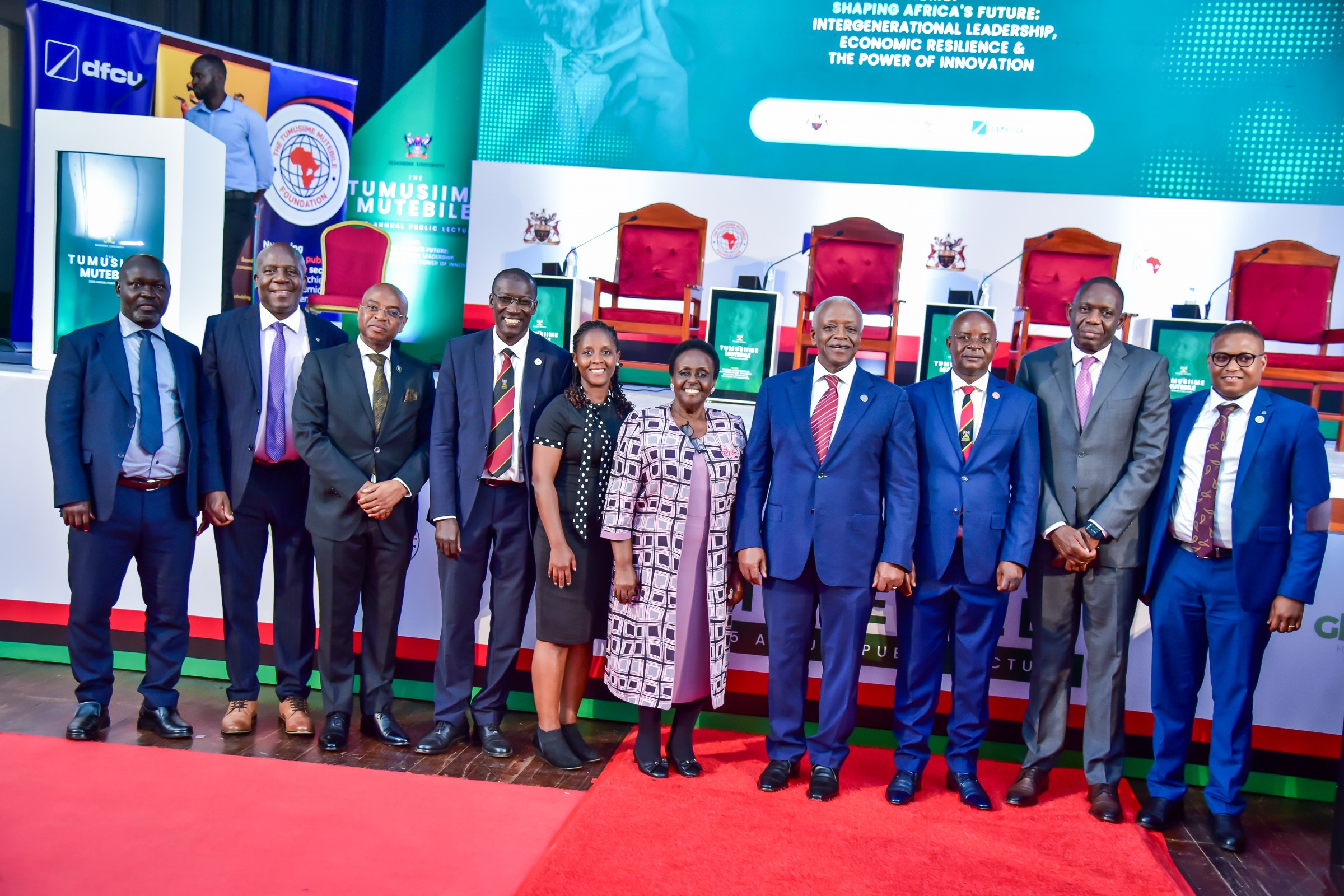
Makerere University on 3rd December, 2025 hosted the Tumusiime Mutebile Annual Lecture, a tradition established to honour the life and legacy of the late Prof. Emmanuel Tumusiime-Mutebile, an outstanding alumnus and former Governor of the Bank of Uganda who passed away in 2022. The lecture not only reflects on his remarkable contribution to Uganda’s economic leadership, but also highlights how innovation, resilience, and intergenerational vision can shape Africa’s future.
This year’s edition was anchored on three key pillars—intergenerational leadership, economic resilience, and the power of innovation—themes that defined Prof. Mutebile’s career and continue to influence national development. Through this annual series, the University upholds his memory while also celebrating other African leaders whose work has left a lasting mark on the continent, using their legacies to inspire thoughtful dialogue, policy reflection, and the next generation of transformative thinkers.
Celebrating an Enduring Legacy
In her remarks, the Acting Vice Chancellor, Prof. Sarah Ssali, reflected on Prof. Mutebile’s lifelong commitment to excellence, integrity, and the transformative power of education. She highlighted his journey from a student leader at Makerere to one of the country’s most influential economic thinkers, noting how his leadership in monetary policy, fiscal reform, and economic stabilization reshaped Uganda’s economic trajectory.
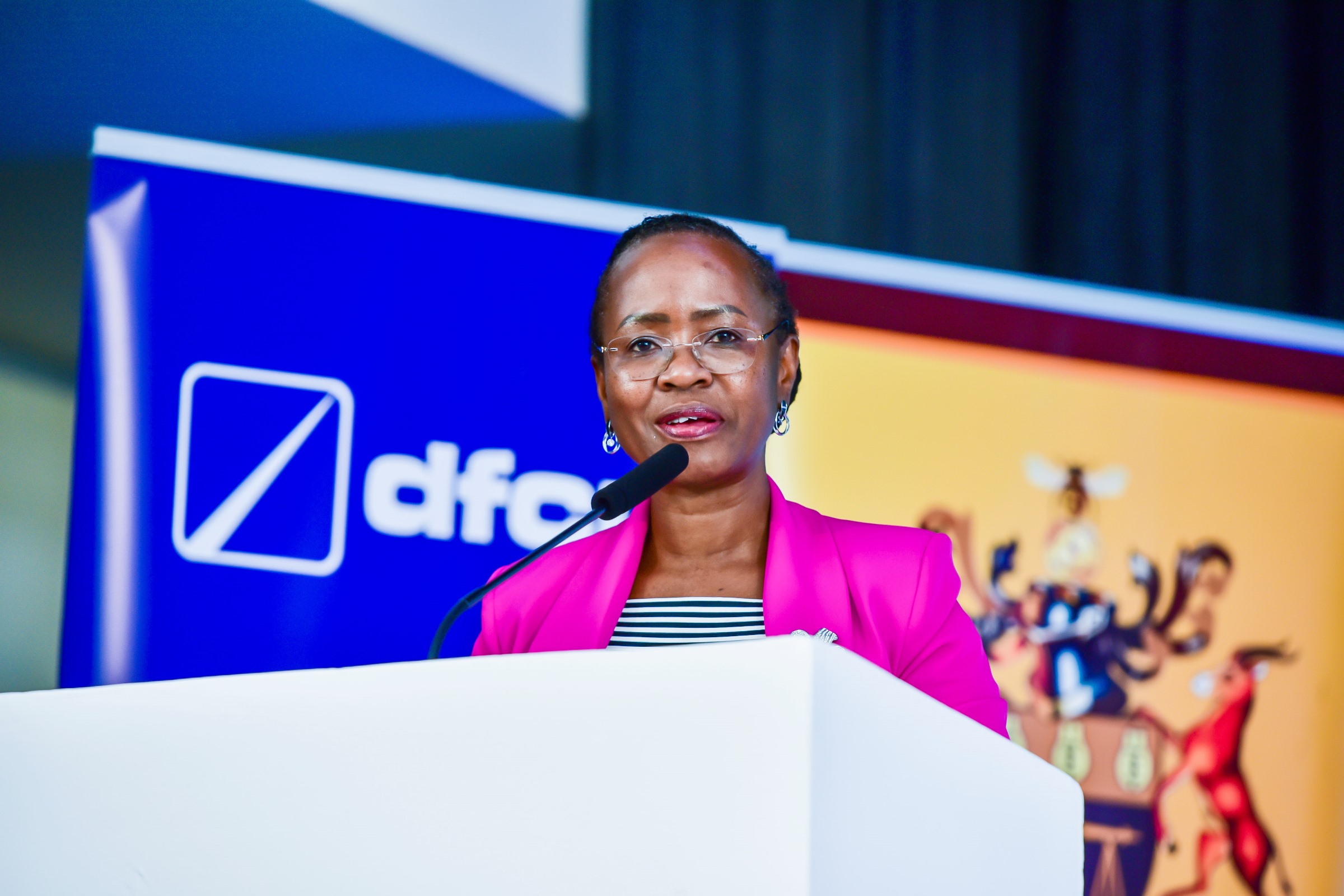
Prof. Ssali emphasized that this public lecture series not only honours Mutebile’s legacy but also bridges academia and practice—challenging students, scholars, and national leaders to pursue knowledge that serves the public good. She expressed gratitude to the Bank of Uganda under Dr. Michael Atingi-Ego, dfcu Bank, the GRO Foundation, the Mutebile family, and the Advancement Office for their continued support in sustaining a platform that nurtures economic thought leadership and inspires future generations.
Rt. Hon. Emeritus Amama Mbabazi, a lifelong friend and contemporary of the late Prof. Emmanuel Tumusiime-Mutebile, delivered a deeply personal reflection during the lecture. He recalled their shared beginnings as young student leaders at Makerere, their early political activism, and the historical moments that shaped both their lives and the nation. Speaking as both confidant and colleague, he emphasized Mutebile’s disciplined approach to economic policy, his unwavering belief in strong, accountable institutions, and his commitment to evidence-based, long-term decision making. Mbabazi outlined three pillars of Mutebile’s legacy—policy integrity, institutional strength, and leadership that prepares the next generation—values he affirmed are central to the work of the Tumusiime Foundation, which he now chairs.

He underscored the critical role of the private sector in Africa’s transformation, stressing the need for productivity-driven economies, skilled young people, and policy ecosystems that encourage innovation. He further called for intergenerational leadership that deliberately transfers knowledge, builds enduring institutions, and creates real opportunities for young Africans to lead. In closing, he urged academia, policymakers, and industry to work in partnership, noting that Africa’s progress depends on disciplined leadership, investment in human capital, and a shared commitment to building a future stronger than the present.
Fiscal Policies that have stood the test of time
The Governor of the Bank of Uganda, Dr. Michael Atingi-Ego, honored the late Prof. Emmanuel Tumusiime-Mutebile with a heartfelt tribute, praising him as “a great tree whose roots ran deep beneath the soil of this nation, nourishing all who followed.” He noted that Uganda continues to benefit from the “shade” of the policies Mutebile planted during his 21-year tenure—policies that stabilized the economy, strengthened institutions, and protected the financial system through multiple crises. He highlighted Mutebile’s role in restoring price stability through cash budgeting, bringing inflation down from triple digits to single digits, guiding the country through the 2008 global financial crisis with disciplined monetary policy, and maintaining public trust during the 2011 inflation spike through clear and transparent communication.

Dr. Atingi-Ego also credited him for steering Uganda safely through the COVID-19 pandemic by introducing liquidity support for banks, credit relief for borrowers, and targeted foreign exchange interventions. Reflecting on Mutebile’s long-term impact, the Governor remarked, “These are the ideas he planted—he never lived to enjoy the shade of the tree, but today, the country rests under it.” He further celebrated Mutebile’s commitment to innovation, citing the 2016 amendments to the Financial Institutions Act that unlocked agency banking, bancassurance, and Islamic banking—reforms that today anchor Uganda’s impressive financial inclusion gains.
Intergenerational Leadership blends agility and emotional intelligence
Eng. Dr. F. F. Tusubira delivered a compelling and deeply reflective keynote, grounding the theme “Intergenerational Leadership, Economic Resilience and the Power of Innovation” in both history and lived institutional experience. He expressed serious concern that although Africa is the world’s youngest continent—with over 65% of its population below 35—its systems continue to sideline young people from leadership and national decision-making, even as they are repeatedly called “leaders of tomorrow.” He argued that this generational exclusion is not merely unfair but dangerous, warning that nations cannot secure economic resilience while locking out the very demographic best equipped to navigate a rapidly evolving, technology-driven world.
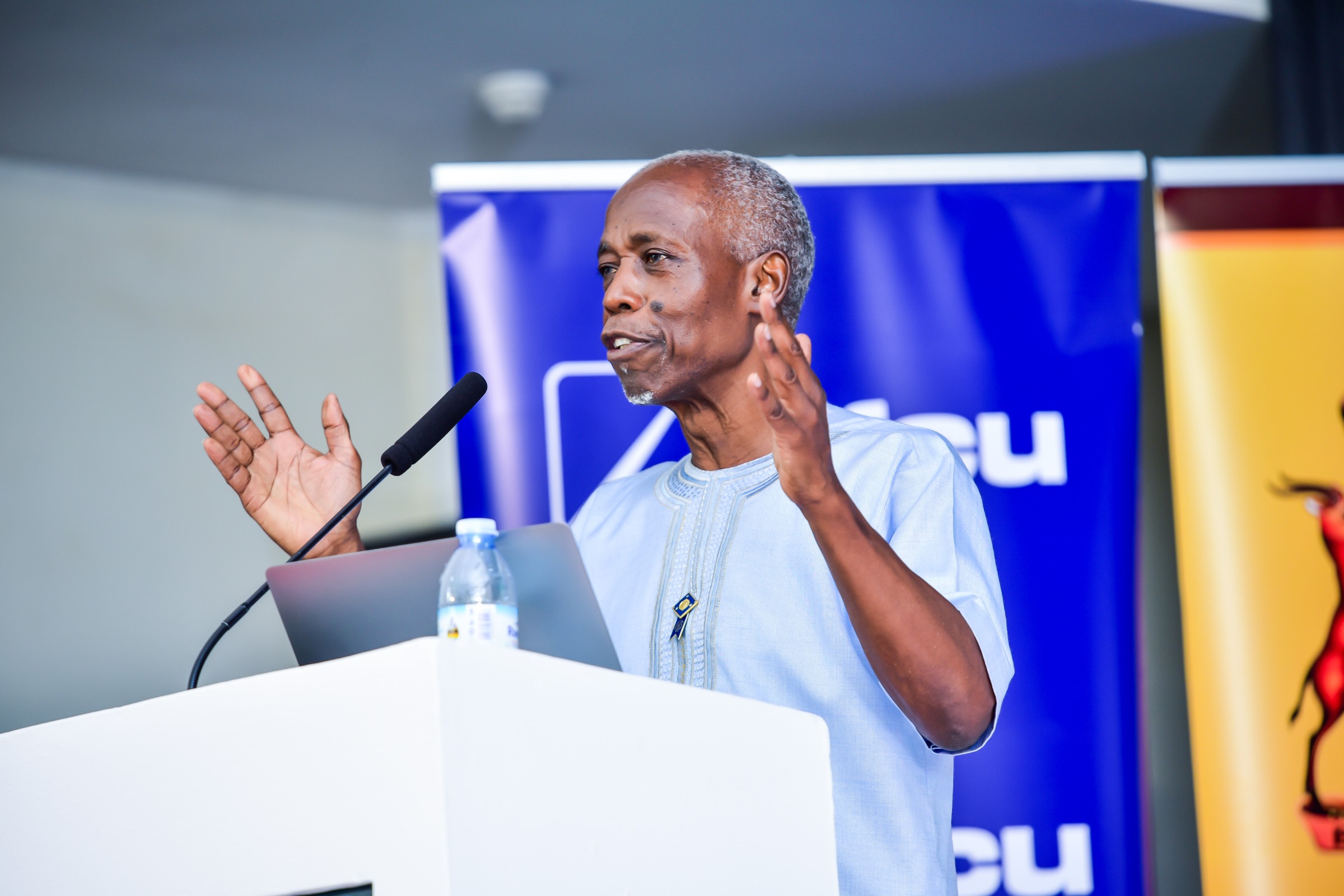
Drawing on African proverbs, global case studies, and personal anecdotes from Makerere and national institutions, he demonstrated how younger generations bring idealism, agility, innovation, and risk-taking—qualities essential for competitiveness—while older generations contribute emotional intelligence, institutional memory and a heightened sense of danger. He emphasized that progress requires blending these strengths through deliberate structures: fair representation of youth in boards and executive spaces, shared decision-making, reverse mentorship, and an institutional culture that values every generational perspective.

Dr. Tusubira also highlighted the urgent need for education reform, criticizing the continent’s entrenched “learning to pass exams” culture and calling for systems that cultivate creativity, problem-solving, and technical capability. He cautioned that without investing in human capital, digital literacy, and inclusive innovation ecosystems, Africa risks losing the very foundation of future competitiveness. His message was clear and powerful: intergenerational leadership is not optional—it is a survival strategy for institutions, businesses, and nations, especially in an era where, as he quoted, “it is not the strongest who survive, but those most responsive to change.”
The lecture was further enriched by an engaging panel discussion, which was moderated by Prof. Edward Bbaale, the Principal, College of Business and Management Sciences. He opened the discussion by deliberately centering today’s students and emerging leaders, framing the session as an intellectual reflection on the life, values and legacy of the late Prof. Emmanuel Tumusiime-Mutebile. He positioned the lecture’s theme — Shaping Africa’s Future: Intergenerational Leadership, Economic Resilience and the Power of Innovation — as urgent and practical, and introduced a cross-disciplinary panel whose expertise mirrors that urgency: Eng. Dr. F. F. Tusubira, Mr. Charles Mudiwa the Managing Director Dfcu Bank, and Prof. Faisal Buyinza the Ag. Dean, School of Economics.

Prof. Bbaale’s moderation enabled panelists to offer guidance on structural and cultural barriers to youth inclusion, the role of institutions in building resilience, and how academia, industry and policy can work together to turn innovation into jobs and scalable solutions — all the while reserving time for direct audience engagement and practical policy takeaways. Collectively, the panelists urged dismantling age-biased barriers and credential rigidities, creating new entry points and “tables” for youth leadership, scaling finance and training for startups and agribusiness, reforming pedagogy to prioritise skills and creativity, and deepening public-private-academic partnerships so innovation becomes inclusive growth rather than isolated experimentation.
The Family’s heartfelt appreciation
Mrs. Betty Tumusiime-Mutebile delivered heartfelt closing remarks, offering gratitude on behalf of the family and the Tumusiime-Mutebile Foundation. Speaking with deep emotion, she reflected on the late Professor’s character—his honesty, humility, hard work, and unwavering commitment to service above self. She thanked Makerere University, the Bank of Uganda, the Foundation’s leadership, and the many friends and colleagues who have continued to uphold his legacy, noting that although nearly four years have passed since his departure, his memory remains vivid and powerful for the family.

She recalled his devotion to both his public duty and his home, sharing personal stories of his leadership within the family and his steadfast faith that shaped their daily lives. Mrs. Tumusiime-Mutebile also highlighted the Foundation’s ongoing work in youth skilling, ethical governance, and private-sector development—initiatives rooted in his own vision. She concluded by inviting continued partnership to sustain the legacy he built, and led the gathering in singing his favourite chorus, a tender tribute to a man whose influence, she said, endures through the lives he touched.
Trending
-
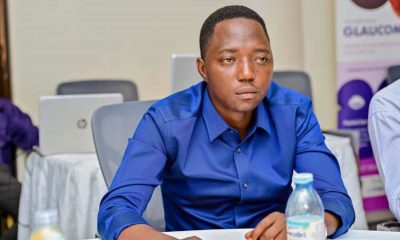
 General2 weeks ago
General2 weeks agoFrom Mastercard Foundation Scholar to Changemaker: Dr. Ekwaro Ronald’s Vision for Eye Health in Uganda
-

 General7 days ago
General7 days agoCall For Expression of Interest: WEE-DiFine Research Initiative
-
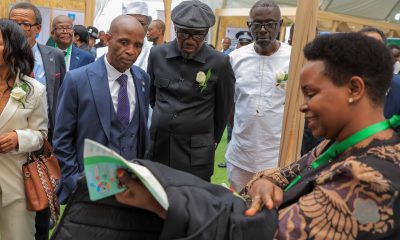
 Agriculture & Environment1 week ago
Agriculture & Environment1 week agoHow transformative education is shaping Africa’s next generation of innovators
-
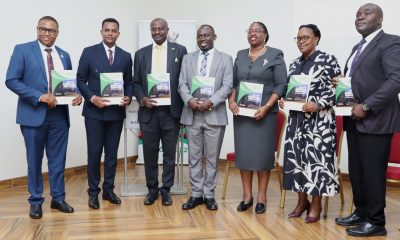
 Business & Management1 week ago
Business & Management1 week agoEfD-Mak, GRO Foundation & BoU Hold High-Level Roundtable on Green and SDG-Linked Financing
-
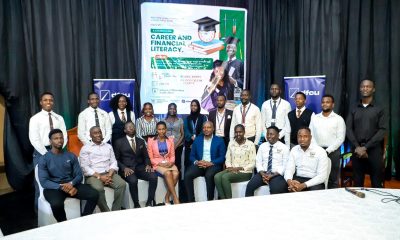
 General7 days ago
General7 days agoFrom Campus to Career: Makerere Advancement Office, 91st Guild and the DFCU Foundation Equip Students with Financial and Employability Skills
